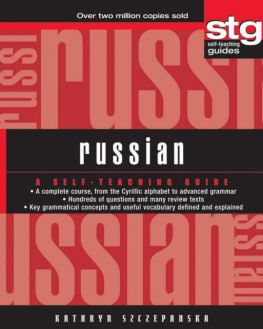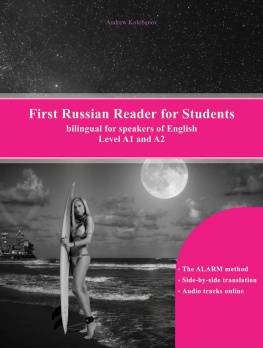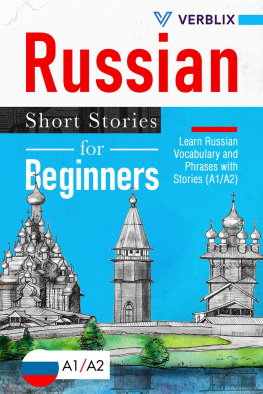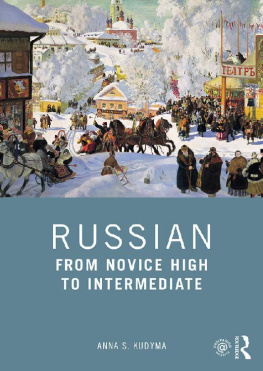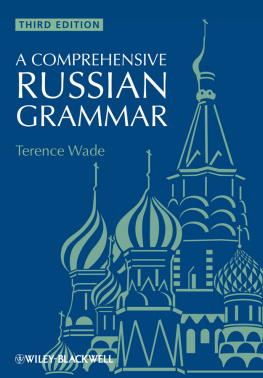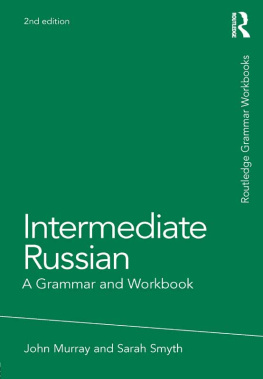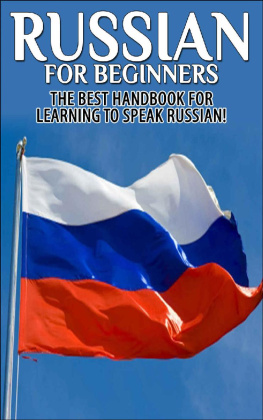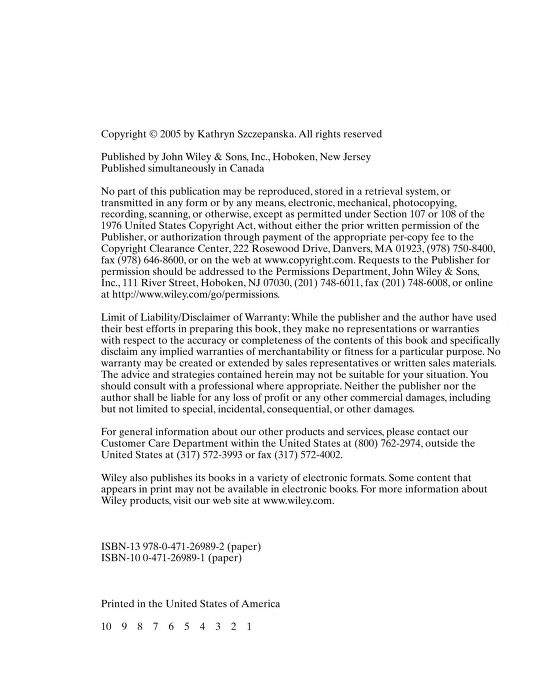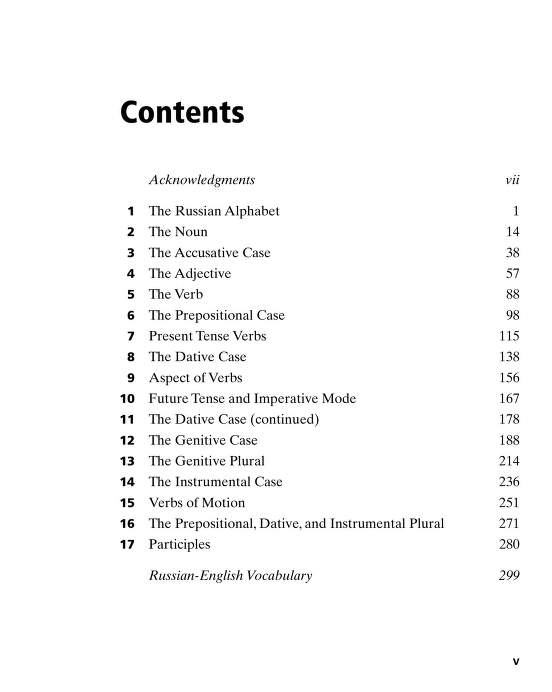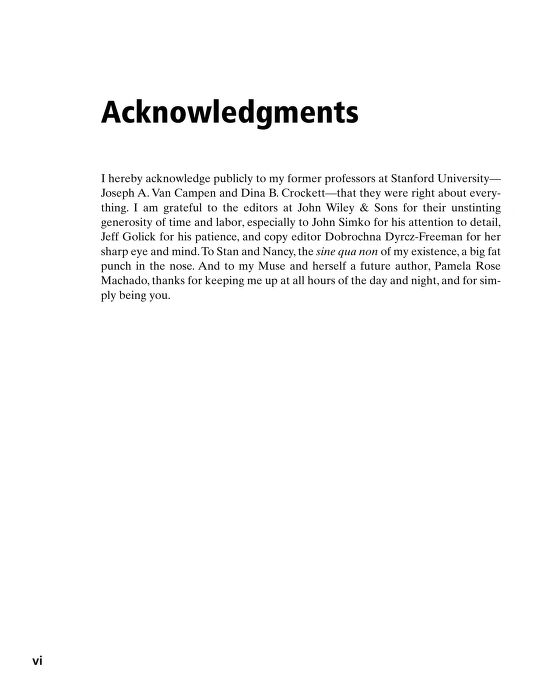
Russian A Self Teaching Guide
This book was produced in EPUB format by the Internet Archive. The book pages were scanned and converted to EPUB format automatically. This process relies on optical character recognition, and is somewhat susceptible to errors. The book may not offer the correct reading sequence, and there may be weird characters, non-words, and incorrect guesses at structure. Some page numbers and headers or footers may remain from the scanned page. The process which identifies images might have found stray marks on the page which are not actually images from the book.
The hidden page numbering which may be available to your ereader corresponds to the numbered pages in the print edition, but is not an exact match; page numbers will increment at the same rate as the corresponding print edition, but we may have started numbering before the print book's visible page numbers. The Internet Archive is working to improve the scanning process and resulting books, but in the meantime, we hope that this book will be useful to you. The Internet Archive was founded in 1996 to build an Internet library and to promote universal access to all knowledge. The Archive's purposes include offering permanent access for researchers, historians, scholars, people with disabilities, and the general public to historical collections that exist in digital format. The Internet Archive includes texts, audio, moving images, and software as well as archived web pages, and provides specialized services for information access for the blind and other persons with disabilities.
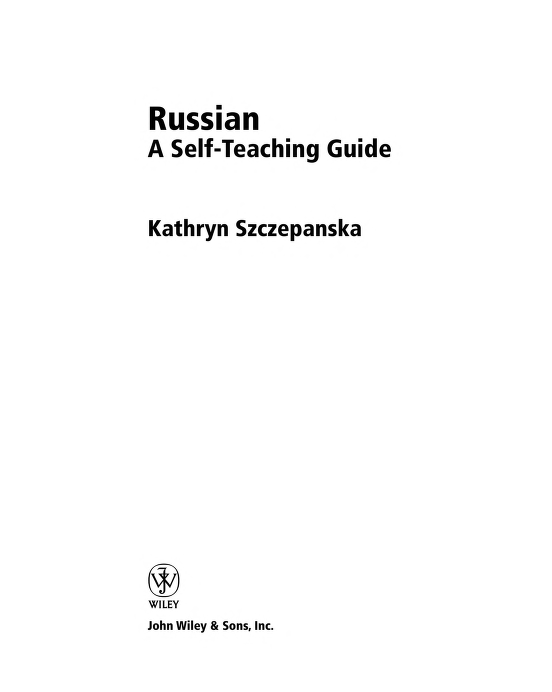

Copyright 2005 by Kathryn Szczepanska.
Copyright 2005 by Kathryn Szczepanska.
All rights reserved Published by John Wiley & Sons, Inc., Hoboken, New Jersey Published simultaneously in Canada No part of this publication may be reproduced, stored in a retrieval system, or transmitted in any form or by any means, electronic, mechanical, photocopying, recording, scanning, or otherwise, except as permitted under Section 107 or 108 of the 1976 United States Copyright Act, without either the prior written permission of the Publisher, or authorization through payment of the appropriate per-copy fee to the Copyright Clearance Center, 222 Rosewood Drive, Danvers, MA 01923, (978) 750-8400, fax (978) 646-8600, or on the web at www.copyright.com. Requests to the Publisher for permission should be addressed to the Permissions Department, John Wiley & Sons, Inc., Ill River Street, Hoboken, NJ 07030, (201) 748-6011, fax (201) 748-6008, or online at http://www.wiley.com/go/permissions. Limit of Liability/Disclaimer of Warranty: While the publisher and the author have used their best efforts in preparing this book, they make no representations or warranties with respect to the accuracy or completeness of the contents of this book and specifically disclaim any implied warranties of merchantability or fitness for a particular purpose. No warranty may be created or extended by sales representatives or written sales materials. The advice and strategies contained herein may not be suitable for your situation. You should consult with a professional where appropriate.
Neither the publisher nor the author shall be liable for any loss of profit or any other commercial damages, including but not limited to special, incidental, consequential, or other damages. For general information about our other products and services, please contact our Customer Care Department within the United States at (800) 762-2974, outside the United States at (317) 572-3993 or fax (317) 572-4002. Wiley also publishes its books in a variety of electronic formats. Some content that appears in print may not be available in electronic books. For more information about Wiley products, visit our web site at www.wiley.com. ISBN-13 978-0-471-26989-2 (paper) ISBN-10 0-471-26989-1 (paper) Printed in the United States of America 10 987654321
In memory of Bruce Everett Fritch (1936-1985)
Contents
| Acknowledgments | vii |
| The Russian Alphabet | |
| The Noun | |
| The Accusative Case | |
| The Adjective | |
| The Verb | |
| The Prepositional Case | |
| Present Tense Verbs | |
| The Dative Case | |
| Aspect of Verbs | |
| Future Tense and Imperative Mode | |
| The Dative Case (continued) | |
| The Genitive Case | |
| The Genitive Plural | |
| The Instrumental Case | |
| Verbs of Motion | |
| The Prepositional, Dative, and Instrumental Plural | |
| Participles | |
| Russian-English Vocabulary | |
V
Acknowledgments I hereby acknowledge publicly to my former professors at Stanford University Joseph A.
Van Campen and Dina B. Crockettthat they were right about everything. I am grateful to the editors at John Wiley & Sons for their unstinting generosity of time and labor, especially to John Simko for his attention to detail, Jeff Golick for his patience, and copy editor Dobrochna Dyrcz-Freeman for her sharp eye and mind. To Stan and Nancy, the sine qua non of my existence, a big fat punch in the nose. And to my Muse and herself a future author, Pamela Rose Machado, thanks for keeping me up at all hours of the day and night, and for simply being you.
PyccKHH ajic|)aBHT The Russian alphabet, also called Cyrillic, consists of thirty-three letters representing thirty-one sounds and two signs that have no phonetic value of their own.
It is attributed to the Greek monks Cyrill and Methodius, who came as missionaries to Christianize the Slavic countries and left their mark on the language as well. Modified forms of this alphabet are still in use today in countries other than Russia, including Bulgaria and some of the new nations of the former Yugoslavia. Approximately one-third of the Cyrillic alphabet consists of letters that are identical to the Roman alphabet, with a phonetic value that is either almost equal or similar. Another third of the letters are recognizable to Westerners because of their Greek origin: n is the Greek pi, p is the Greek rho, and so forth. The final third consists of letters that were created to represent sounds in the Slavic languages that had no counterpart in the original Greek of the missionary monks. Some of these letters have a Hebrew origin, such as the letter in [sh].1 Although there are visual and phonetic similarities, almost no Russian letter is pronounced in quite the same way as its English counterpart.
Next page
